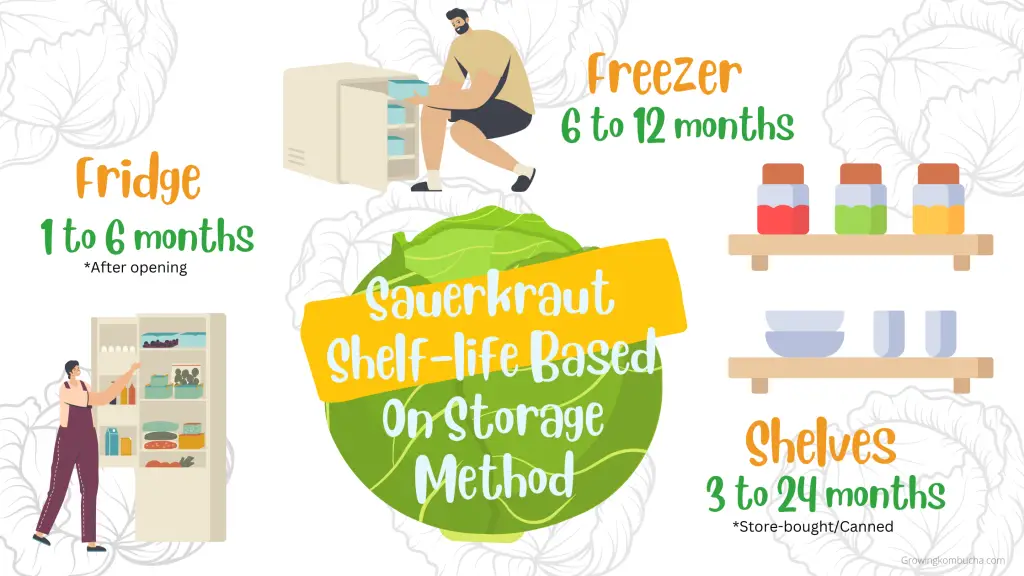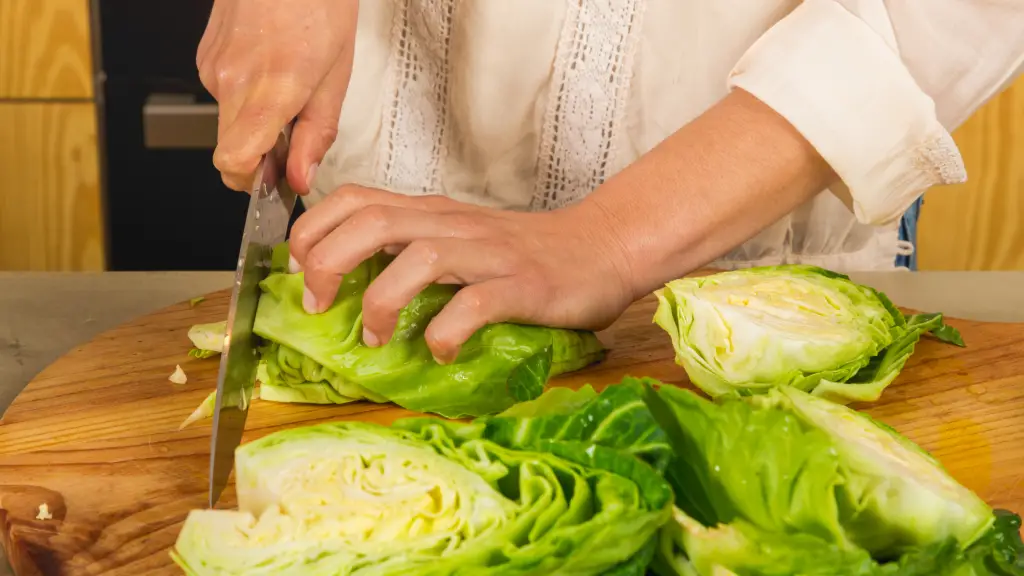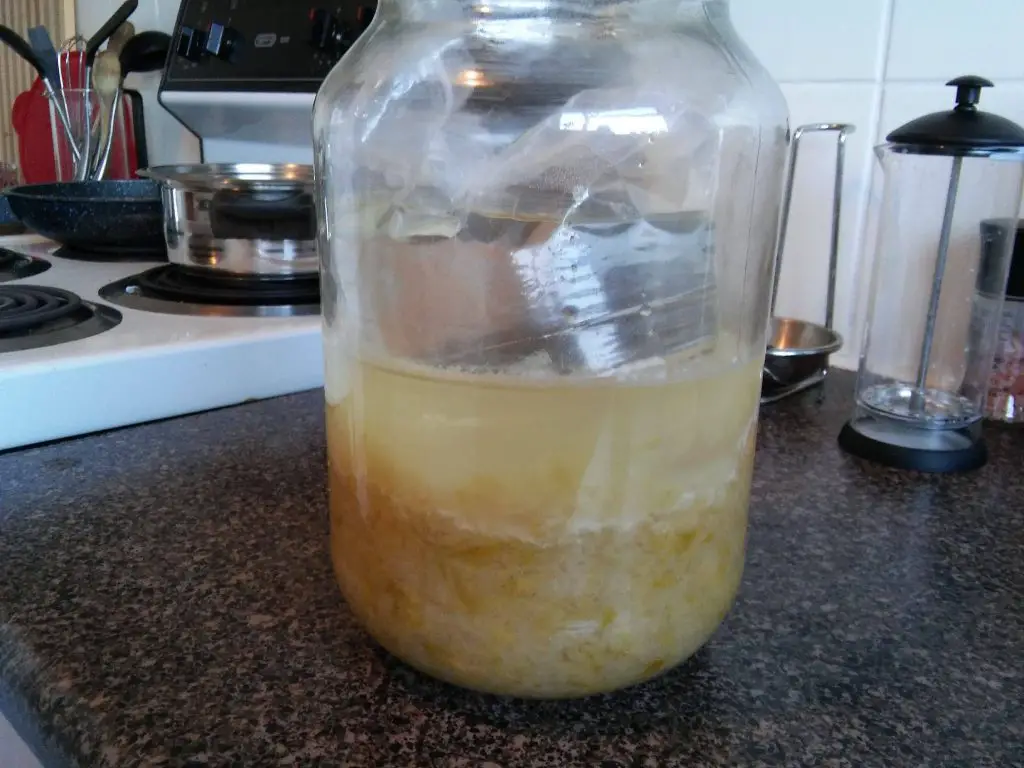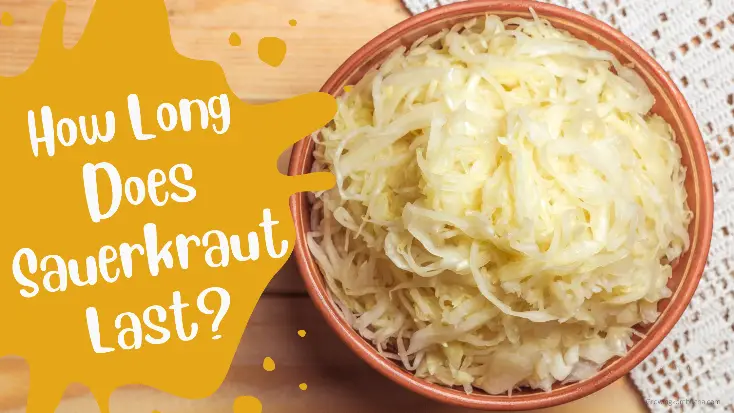Fermented foods like sauerkraut are known to get better with age due to their fermentation process. However, there are some factors that can affect their shelf-life such as exposure to contaminants and storage methods. In this post, learn how long does sauerkraut last and how you can extend its shelf-life.
Q: How long does sauerkraut last?
A: Sauerkraut can last for around two weeks to 24 months. The duration mainly depends on how it is processed and how it is stored. Unopened sauerkraut can last for 6 months to a year when placed in the fridge. Most fermentation lovers also notice that homemade sauerkraut or unpasteurized sauerkraut lasts longer than commercially produced sauerkraut.
In a nutshell, here’s the rule of thumb when identifying the potential shelf-life of sauerkraut:
- 6 months to a year: Unopened, sealed, and refrigerated sauerkraut.
- 1 to 6 months (uncontaminated jar): Opened and refrigerated sauerkraut.
- 3 to 6 months: Stored on shelves and unopened sauerkraut.
- 3 days to 1 week: Unrefrigerated and opened.
- 1 to 3 months: Pasteurized sauerkrauts (fermented in a short time).
Opening a jar of sauerkraut decreases its shelf-life due to its exposure to contaminants in the air or in the spoon that you dip in the jar. It may not spoil as fast as other food because it contains a high concentration of lactic acid. However, bacteria and mold can still contaminate the whole jar.
Shelf-life of sauerkraut based on storage method
Since sauerkraut is now commercially available, novice fermenters often wonder why some can last for almost a year without going bad. The reason behind it is the conditions that apply when it comes to the storage of sauerkraut to ensure that they’ll last longer.
Check out the FAQs below and the conditions that determine the shelf-life of sauerkrauts in every storage method:
How long does sauerkraut last in the fridge?
Unopened homemade sauerkraut can last for six months to a year in the fridge. Though its freshness may degrade if it reaches one year, it will still be edible when stored in a chilled environment. The cool temperature in the fridge helps slow down the good bacteria and yeast which helps extend its shelf-life.
Once opened, sauerkraut will last for one to four weeks in the fridge. It can only last for a month if it is sealed properly and not contaminated with a used spoon or left exposed in the fridge. The rule of thumb is that the contamination of microscopic bad bacteria will speed up the spoilage and formation of mold in your sauerkraut.

How long does sauerkraut last on the shelves?
The two ways to determine the shelf-life of sauerkraut out of the fridge are the best before date and if it is canned. Pasteurized sauerkrauts can often last 4 to 6 months on the shelves, as long as it remains unopened. Once it’s opened, you must consume it within a week before it turns very sour or unsafe to eat.
Canning is the best method to make sauerkraut shelf-stable for a very long time. If stored properly, they can last on the shelves for up to two years. So, if you’ve got a large harvest of cabbages during the growing season, chop them up and start canning so you can savor delicious krauts during the cold winter months.
Learn how to can sauerkraut using the water bath method in the video below from Whippoorwill Holler. She used her grandma’s recipe where she added sugar and vinegar to the kraut and performed different techniques to prepare the sauerkraut for canning.
Canning is an ancient preservation method that uses heat from boiling water to kill any bacteria in any jar of food. If you’re new to canning, the materials she used are as follows:
How long does sauerkraut last when frozen?
Frozen sauerkraut can last in the freezer for six months to a year. Going beyond that time frame can compromise the flavor and texture of cabbage. The only problem that you should look out for is freezer burns, especially with leafy vegetables like cabbage.
Freeze sauerkraut in freezer-safe bags or containers and make sure to sterilize them well. If you want to eat your frozen sauerkraut, you need to thaw it in the fridge overnight and start eating it the next day.
Note: Only use filtered water in fermenting your ginger bug and soda. Tap water contains chlorine that can kill all the beneficial microbes that do the actual fermentation process.
Learning more about the process of fermentation can help you identify the reasons behind the varying shelf life of sauerkraut. Fermented foods may undergo different fermentation processes but all of them are transformed by yeast and good bacteria.
What is sauerkraut and how its nature affects its shelf-life
Sauerkraut or sour cabbage is a traditional German dish made up of thinly sliced cabbage fermented with brine or salt and water. It has a sour flavor and a pungent smell just like kimchi. The salt helps draw the water out of the cabbage and becomes the breeding ground of good bacteria to create lactic acid.
The fermentation of sauerkraut is fast and simple. Thinly sliced cabbage and salt are mixed together to extract the water from the cabbage. Then, the cabbage will be placed in an airtight jar and pushed at the bottom to keep them submerged in the brine.
Fermenters use a thin sheet of plastic to cover the top of the brine and use a fermentation glass weight to keep the cabbage submerged. The jar will be sealed with an airtight lid to prevent contamination.

When the sauerkraut starts fermenting, the good bacteria will release carbon dioxide as it consumes the sugar in cabbage, which can create air pressure. So, the lid should be loosened from time to time to burp the jar and prevent it from exploding. It is stored in a cool and dark place away from sunlight during fermentation
The whole fermentation process usually takes at least two weeks at temperatures of 65°F to 75°F. The longer you keep it at room temperature, the further it will ferment which will produce a more intense flavor.
As soon as the perfect flavor is achieved, the sauerkraut should be stored in the fridge to stop the fermentation process. If it is left in the pantry or cupboard, second fermentation may commence which can change the flavor and texture of the cabbage.
Does Sauerkraut Go Bad?
Sauerkraut goes bad when it is contaminated with mold and has been fermenting for a very long time. Extended fermentation may not cause it to rot but the taste will be too sour or unpleasant to eat.
The essence of fermentation is best defined by author and fermentation revivalist Sandor Kats as the flavorful space between fresh and rotten. Sauerkraut is a fermented vegetable wherein cabbage is essentially left with brine to go bad so good bacteria can transform its flavors. The only difference between spoilage and fermentation is the kind of bacteria that develops in the food or drink.
What are the signs that sauerkraut has gone bad?
Sauekraut has a tangy flavor that makes some people wonder to what extent can they tell if it’s still safe to eat. Good quality sauerkraut has a pinkish and yellow color and smells clean with slight hints of sour smell. However, there are tricky and visible signs that can tell you if it’s no longer safe to eat, such as:
- Discoloration with brown and pale colors.
- Rotting odor.
- Mold growth on the top and under the jar.
- Slimy or mushy texture
If you have no idea how long sauerkraut has been sitting in your fridge, better toss it out to be safe, especially if it’s not sealed properly.

How to extend the shelf-life of sauerkraut?
Once the jar has been opened, the best way to extend the shelf-life of sauerkraut is to chill it in the fridge, freeze it, or transfer it to smaller bottles. Check out the pros and cons of each method below:
- Freezing: Freezing sauerkraut may alter the texture of the cabbage and kill some probiotics but some good bacteria may survive and stay dormant. This method can keep your sauerkraut for 6 to 12 months.
- Storing sauerkraut in the fridge: Keeping the sauerkraut away from sunlight and heat will slow down the fermentation process and keep them in good condition for at least a month. You just need to make sure that they are submerged in brine and do not touch the tip of the lid to avoid contamination.
- Transferring sauerkraut into smaller jars: After fermenting a big batch of sauerkraut in one jar, transfer it to smaller jars to prevent contaminating the whole batch in one go. Small jars are easier to grab and help you manage your stash of sauerkraut based on consumption.
Warning: The impact of freezing and canning sauerkraut
Freezing and canning are methods that can preserve your sauerkraut for several months to a year. However, these involve extreme temperatures that may change the texture of cabbage and kill some of the gut-healthy bacteria in the kraut.
Frozen or canned sauerkraut is softer than fresh ones. If you want to keep them crunchy, professional fermenters suggest that you should add white vinegar to the jar before canning and freezing it. Vinegar also helps prevent bacterial growth in the long-term storage of sauerkraut and adds some tangy flavor.
Frequently Asked Questions (FAQs)
Is it better to freeze or can sauerkraut?
Yes, canning and freezing are the best methods for the long-term storage of sauerkraut. freezing can retain some probiotics while canning helps keep them shelf-stable but may kill all the probiotics.
How long can you freeze homemade sauerkraut?
You can keep sauerkraut in the freezer for two to six months. Just like other frozen vegetables, they will not spoil but may become softer after thawing. They are also at risk of freezer burns, so make sure to use freezer-safe bags or containers.
Can you freeze fresh sauerkraut?
Yes, sauerkraut is best frozen as soon as it finishes fermentation. Freezing sauerkraut that has been exposed to air for quite a while has a higher chance of being contaminated. Storing contaminated kraut makes the process useless since you’ll need to toss it into the trash eventually.
How long does sauerkraut last in the fridge unopened?
Unopened sauerkraut can last longer since it is not yet exposed to contaminants. However, it should be stored in a cool and dark place to extend its shelf-life for several months to a year.
Can I make my own sauerkraut?
Yes, fermenting sauerkraut is very simple and affordbale. With a jar, salt, and cabbage, you can have your own gut-healthy stash of vegetables. You can add it to sandwiches and goes well as a side dish to grilled meat or fish.
Is sauerkraut good for you?
Sauerkraut contains the benefits already present in cabbage and enhances its health benefits through the probiotics developed during fermentation. It’s good for digestion, boosts the immune system, and contains anti-carcinogenic effects.
